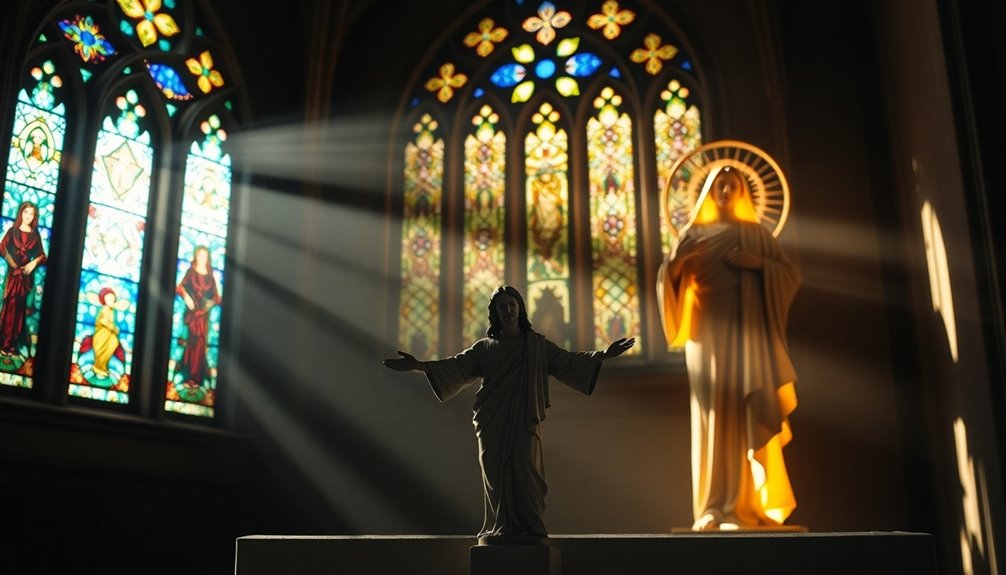God and Jesus aren't the same person, but are distinct entities within the Trinity. The Father, Son (Jesus), and Holy Spirit each have unique roles while being co-equal and co-eternal. This relationship is backed by scripture, revealing that Jesus prayed to the Father, emphasizing their distinct identities. The doctrine of the Trinity explains this complex unity in Christian theology. Misunderstandings often arise from viewing them as the same entity, but they exist as unique persons. If you're curious about how this affects faith and understanding, there's much more to explore about their divine connection.
Key Takeaways
- God and Jesus are distinct persons within the Trinity, not the same person, with unique roles in salvation and creation.
- Jesus is fully God, as stated in John 1:1-2, affirming His divine nature while being a separate person from the Father.
- The Trinity comprises God the Father, God the Son (Jesus), and God the Holy Spirit, emphasizing co-equal and co-eternal relationships.
- Jesus prayed to the Father, demonstrating their distinct identities and roles within the Godhead, as illustrated in John 16:28.
- Misunderstanding the Trinity often leads to viewing it as modes of one person, which contradicts foundational Christian beliefs established in early church councils.
Introduction

Have you ever wondered if God and Jesus are the same person? This question dives deep into the doctrine of the Trinity, which teaches that God exists as three distinct persons: God the Father, God the Son (Jesus), and God the Holy Spirit. These three are co-equal and co-eternal, yet they aren't the same person.
You might be surprised to learn that many biblical references highlight both the unity and distinct identities of Jesus and God. For instance, in John 1:1-2, Jesus is identified with God, while in John 10:30, He declares, "I and the Father are one," emphasizing their relationship without merging their identities.
The early church councils, like Nicaea, helped clarify this belief, affirming that Jesus is fully God but distinct from God the Father. Additionally, Jesus often prayed to the Father, which illustrates their unique roles within the Trinity.
Modalism, the idea that God appears in different forms at different times, is rejected by Trinitarians who assert that all three persons exist simultaneously. Understanding these distinct identities of God, Jesus, and the Holy Spirit can enrich your faith and comprehension of divine relationships.
Scriptural Evidence of Divinity

When exploring the divinity of Jesus, you'll find key scriptural references that highlight His unique relationship with God.
For instance, passages like John 1:1-2 and Colossians 2:9 directly affirm His divine nature.
As we consider both primary and secondary Bible references, you'll see how these texts collectively shape the understanding of Jesus' identity.
Primary Bible References
The Bible offers several key passages that affirm the divinity of Jesus while also highlighting His unique relationship with God the Father. In John 1:1-2, it states, "In the beginning was the Word, and the Word was with God, and the Word was God," establishing that Jesus is God. This passage forms a foundation for understanding the doctrine of the Trinity, where you see the three Persons—God the Father, Jesus, and the Holy Spirit—working in unity.
Colossians 2:9 further emphasizes this by declaring that "in Christ all the fullness of the Deity lives in bodily form." This reinforces that Jesus is fully divine while being fully human.
Additionally, in Matthew 28:19, you're instructed to baptize "in the name of the Father, and of the Son, and of the Holy Spirit," showcasing the distinct roles within the Trinity.
Jesus also confirms His oneness with God the Father in John 10:30, saying, "I and the Father are one."
Moreover, John 16:28 reveals His distinct identity, as He states, "I came from the Father and have come into the world," illustrating the profound relationship between God.
Secondary Bible References
Often, believers turn to secondary Bible references to further understand the divinity of Jesus. The Bible says in John 1:14 that "the Word became flesh and dwelt among us," highlighting the incarnation of Jesus the Son as both divine and human. This dual nature is essential for grasping the fullness of His identity.
Colossians 2:9 supports this by declaring, "in Christ all the fullness of the Deity lives in bodily form," emphasizing the deity of Christ.
Furthermore, John 10:30 records Jesus stating, "I and the Father are one," which showcases a profound unity in essence between God the Father and Jesus the Son. This unity suggests they're one in nature, yet the Bible also clarifies the existence of three distinct persons within the Godhead.
Matthew 28:19 instructs believers to baptize in the name of the Father, Son, and Holy Spirit, reinforcing this concept.
Lastly, Hebrews 1:3 describes Jesus as "the radiance of God's glory and the exact representation of his being," affirming His divine nature and the deep relationship between Jesus and God the Father.
These references collectively illustrate the complex and beautiful truth of Christ's divinity.
Jewish Monotheism's Influence on Beliefs

Jewish monotheism regularly shapes the beliefs of Christians, providing a crucial foundation for understanding the nature of God and Jesus. At the heart of this monotheistic framework is the Shema, which declares, "The LORD our God, the LORD is one." This declaration emphasizes a commitment to one God, influencing how early Christians viewed their relationship with God the Father and how they understood Jesus and God together.
As early Christians, many of whom were Jewish, navigated the integration of Jesus' divinity within this strict monotheistic context, they faced challenges. They sought to reconcile the belief in one God in three persons while honoring the Shema.
The prophetic texts in Jewish scriptures also played a role, as they foretold the coming of the Messiah, which many believed Jesus fulfilled without compromising monotheism.
This tension led to significant theological discussions during early church councils, where debates around Christological doctrines emerged. These councils aimed to define the nature of Jesus in relation to God the Father while maintaining the core tenet of Jewish monotheism.
Thus, Jewish monotheism profoundly influences Christian beliefs, shaping the understanding of God and Jesus' divine nature.
Trinitarian Relationships Explored

While many may find the concept of the Trinity challenging, it offers a profound understanding of God's nature. The Trinity describes God as one essence existing in three distinct persons: God the Father, God the Son (Jesus), and God the Holy Spirit. Each person is co-equal and co-eternal, emphasizing their unique roles and relationships.
In the Bible, Jesus explicitly states His relationship with the Father, highlighting their distinct identities while affirming their unity. For instance, in John 10:30, He declares, "I and the Father are one." This statement underscores the connection between God the Father and God the Son, while maintaining their individuality.
Biblical passages such as John 1:1-3 further illustrate this relationship, showing that Jesus was both with God and was God, reinforcing His divine nature yet distinct personhood.
The Nicene Creed, established during early church councils, articulates the belief in the Trinity, affirming that Jesus is "true God from true God."
Understanding these relationships is crucial, as Jesus serves as the mediator between humanity and God the Father, while the Holy Spirit guides believers in their faith journey, revealing the depth of the Trinity's interplay.
Misunderstanding the Trinity

When you think about the Trinity, it's easy to get confused and mix up the roles of the Father, Son, and Holy Spirit.
Many people mistakenly believe they're just different modes of the same person, but that contradicts what scripture teaches.
Let's clear up these misconceptions and explore how each person of the Trinity maintains a unique identity while working together in harmony.
Debunk Common Misconceptions
Misunderstanding the Trinity can lead to some common misconceptions about the nature of God and Jesus. Many people think of God operating in different modes rather than recognizing that God exists as one essence in three distinct persons: God the Father, God the Son (Jesus), and God the Holy Spirit. This misconception can undermine the rich, relational nature of the Trinity.
The Bible tells us that each person of the Trinity has unique roles. For example, God the Father is the creator, while Jesus, the Son, is the redeemer. The Holy Spirit serves as the sustainer and guide for believers.
Key biblical references, like Matthew 3:16-17 during Jesus' baptism, illustrate the distinct presence of all three persons, showing they co-exist simultaneously rather than being different manifestations of the same individual.
Historical documents, such as the Nicene Creed, have reinforced the understanding that Jesus is fully divine and distinct from the Father.
Contradictory Scriptural Interpretations
Several key scriptural passages contribute to the confusion surrounding the Trinity, leading to contradictory interpretations. You might find verses like John 10:30, where Jesus states, "I and the Father are one," particularly puzzling. This emphasizes the unity of essence between God the Father and the Son of God, but it doesn't mean they're the same person.
Misinterpretations often arise from modalism, the belief that God reveals Himself in different modes rather than as three distinct persons. This contradicts biblical references that highlight the unique roles of each member of the Trinity, such as Matthew 28:19.
When you read John 16:28, you see Jesus praying to the Father, reinforcing the idea that Jesus and God aren't interchangeable.
Historical debates, like those at the Council of Nicaea, clarified these distinctions, affirming that Jesus is co-eternal with God the Father. Understanding these nuances helps you grasp that while they share a unity of essence, they exist as three distinct persons.
Through careful examination of scripture, you can resolve the confusion surrounding the nature of God and Jesus.
Daily Faith Practices

Daily faith practices, like prayer and Bible study, can deepen your understanding of the relationship between God and Jesus.
When you take time to reflect on their distinct roles, you not only grow spiritually but also strengthen your community connections.
Engaging in group sessions can spark meaningful conversations that enhance your faith journey. Incorporating uplifting Psalm verses into your discussions can further inspire and motivate your group.
Daily Prayer Reflections
Prayer reflections offer a powerful way to explore the unique roles of God and Jesus within the Trinity. Through daily prayer reflections, you can deepen your understanding of these three distinct persons: God the Father, Jesus Christ, and the Holy Spirit. As you pray, focus on their individual functions while appreciating their unity in essence.
Engaging in daily prayers fosters a personal relationship with Jesus as the mediator between humanity and God. This relationship reinforces your belief in His divine authority and role in salvation. You might incorporate scriptural references, like John 10:30, to remind yourself that "I and the Father are one," reflecting on the nature of their relationship.
Additionally, expressing gratitude for the distinct roles of the Father, Son, and Spirit can enhance your spiritual journey. As you reflect on Jesus' identity, consider Colossians 2:9, which describes Him as both fully God and fully man. This dual nature enriches your understanding of His place within the Trinity.
Embrace these daily prayer reflections to cultivate a deeper appreciation for the unique identities and the interdependent roles of God, Jesus, and the Spirit in your life.
Group Bible Study Sessions
Exploring the intricacies of the Trinity during group Bible study sessions can deepen your understanding of faith and enhance your spiritual growth. When you engage with scripture, especially the Gospel of John, you uncover profound truths about God the Father, God the Son (Jesus), and God the Holy Spirit as three distinct persons.
It's essential to recognize that while Jesus clearly states, "I and the Father are one" (John 10:30), this emphasizes unity in essence or nature without equating Him to being the same person as God the Father.
In your Bible study, discussing passages like John 1:1-14 reveals how Jesus, though fully divine, is also a separate individual who became flesh.
Engaging with these themes allows you to appreciate the unique roles of each person in the Trinity. By exploring their interdependent relationships, you can grasp how each contributes to your faith journey.
Group discussions can help clarify misconceptions and deepen your comprehension of their distinct identities. Through this exploration, you'll strengthen your daily faith practices and foster a more profound connection to God in all His fullness.
Final Thoughts on Divinity

Considering the complexities of divine nature can be both enlightening and challenging. The doctrine of the Trinity reveals that God exists as three distinct Persons: God the Father, God the Son (Jesus), and God the Holy Spirit. Each shares one divine essence while maintaining unique roles. This understanding is pivotal for grasping how these distinct persons operate within the framework of faith.
In Colossians 2:9, you're reminded that Jesus embodies the fullness of deity, affirming His divine nature. The Gospel of John further emphasizes this relationship, as Jesus states, "I and the Father are one" (John 10:30). This highlights their unity in essence while clarifying their distinction in personhood.
Historical church councils, notably Nicaea and Chalcedon, shaped our beliefs about Christ's divinity and His connection to God the Father. These gatherings reinforced the understanding that both Jesus and the Father play integral roles in salvation and spiritual guidance.
Ultimately, recognizing the distinct persons within the Trinity enriches your theological perspective. It deepens your appreciation for the divine mystery and invites you into a more profound relationship with each aspect of the Godhead.
Additional Resources

To deepen your understanding of the relationship between God and Jesus, a variety of resources are available. Start by exploring the doctrine of the Trinity, which teaches that God exists as three distinct persons: God the Father, God the Son (Jesus), and God the Holy Spirit. Each is co-equal and co-eternal, emphasizing their unity in essence while maintaining individual identities.
Biblical passages like John 1:1-3 and Colossians 2:9 affirm Jesus' divine nature, highlighting His distinction from God the Father while also being fully God. Historical documents, such as the Nicene Creed, clarify this relationship, rejecting modalism and reinforcing the orthodox view of the Trinity. The Creed articulates the belief in one God in three persons, making it a valuable resource for understanding this complex topic.
Additionally, consider reading theological texts that delve into the implications of the Trinity for salvation and Jesus' vital role within the Godhead. Engaging with these resources will provide you with a deeper insight into the intricate relationship between God and Jesus, enhancing your overall comprehension of Christian theology.
Frequently Asked Questions
What's the Difference Between God and Jesus?
When you consider the difference between God and Jesus, you'll find that God typically refers to the Father, the creator of the universe.
Jesus, on the other hand, is the Son, who came to Earth to redeem humanity.
While both are divine, they hold distinct roles within the Trinity.
Jesus prayed to God the Father, showing their unique identities, yet both share the same essence, embodying the fullness of deity.
Do We Pray to Jesus or God?
When you pray, you can approach God the Father, as Jesus taught in Matthew 6:9.
However, you're also encouraged to pray in Jesus' name, acknowledging His role as your mediator.
It's common to pray directly to Jesus, too.
The Holy Spirit assists you in your prayers, interceding on your behalf.
Ultimately, it's about your personal relationship with each Person of the Trinity, recognizing their unique roles in your spiritual life.
Does Jesus Ever Call Himself God?
You won't find Jesus explicitly calling Himself God in the Gospels.
However, His statements and actions imply His divine nature. For instance, when He says, "I and the Father are one" in John 10:30, He suggests a unique unity with God.
Additionally, His use of "I AM" in John 8:58 connects Him to the divine.
These assertions convey His authority and identity, pointing to a profound relationship with God without direct claims.
Who Is True God, Jesus or God?
When you ask who the true God is, it's essential to understand that both God the Father and Jesus embody divinity in different ways.
Jesus is recognized as true God from true God, fully divine yet distinct in personhood. In this relationship, both share the same divine essence, affirming their unity.
Ultimately, you see both as integral parts of the Trinity, each playing unique roles while being co-equal and co-eternal.










